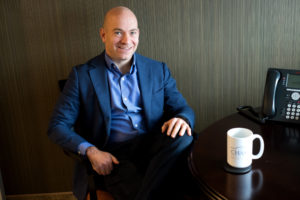
Cleveland Conversations
Cleveland Conversations: Chase Properties is ‘extremely disciplined’ in buying properties, CEO says
Mar 30, 2021, 6:38pm EDT
CHASE PROPERTIES
Chase Properties Ltd. in Beachwood, Ohio, invests in open-air retail centers with stable retail tenants in smaller markets across the Midwest and southern United States.
It’s not the sexiest real estate approach, but it has yielded steady returns for investors, especially during the pandemic, which has spelled disaster for so many retailers.
Chase Properties acquired Shops on the Circle in Dothan, Alabama, in November, the latest in a series of similar transactions made with money raised from high-net-worth investors and family offices in Northeast Ohio.
The Beachwood firm also broke ground in October for a 50,000-square-foot addition for its cold-storage warehouse and distribution center in Solon, Ohio.
Co-CEO Yoel Mayerfeld talked with me about how his company does retail real estate deals, especially during a pandemic. This interview has been edited for clarity and brevity.
What is Chase Properties’ strategy for investing in open-air retail centers?
Our strategy is to invest in stable retailers in secondary markets, which often are 30 to 50 miles away from the nearest retail market. These isolated markets are under-appreciated so they are mispriced compared to their risk.
We are extremely disciplined in our approach to buying properties. We don’t overreach by paying more for a property than we think it’s worth. One of the things investors like about us is that we have significant skin in the game. We are significant investors in each of our funds.
Because part of our strategy is to buy the best center in secondary markets, when we do have vacancies, we are typically the first place a retailer wants to be in that market. That gives us somewhat of a monopolistic position in the markets we invest in. Ours is a contrarian approach that has enabled us to be a successful investor in this space.
What’s your firm’s secret sauce when it comes to choosing an open-air center in which to invest?
It’s our retailer relationships. We earn a solid return because we’re proactive managers, and we have a conservative leverage strategy, but cultivating relationships with stable retailers helps us understand and manage the risk in the centers we own or want to acquire. We also cultivate relationships with the best commercial real estate brokers. But a high-performing retailer is what first gets us excited about any shopping center we look at.
How do you know when it’s time to sell a retail center?
We’re selling a retail center in Stillwater, a suburb of Minneapolis. It’s a great market, but it’s not quite as isolated as our other markets. We think having a more local owner is probably right for that property. We’re not geographically close to the property, so it’s less efficient for us to manage.
What strategies have you seen winning retailers adopt during the pandemic?
Buying online and picking up at a brick-and-mortar store has been huge. Many of our tenants’ sales have been stable or even increased during the pandemic because of their adaptability and distribution-like capabilities. The other significant part is inventory management that comes through technology enables retailers to more efficiently move merchandise.
Target, which is a tenant of ours, recently said more than 90% of its online order fulfillment is coming from its stores. Even more striking is how much cheaper it is for the company to fulfill orders from its stores than from its distribution centers.
We’re also finding that drive-throughs are becoming increasingly important to our retailers, like Starbucks. The pandemic expedited this trend. This is a reflection of how important convenience is to consumers. Winning retailers try to make shopping as frictionless and easy as possible. That’s why we feel comfortable continuing to invest in this space — there’s going to continue to be a need for a physical location.
How do you raise money for your investment funds?
We have a long track record of consistently returning 8% to 9% on investment, so we’ve been able to grow strictly on referral. By connecting with operators that have boots on the ground like we do, our investors pay lower fees. We’re currently in the midst of our fourth fund.